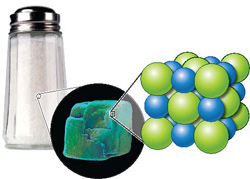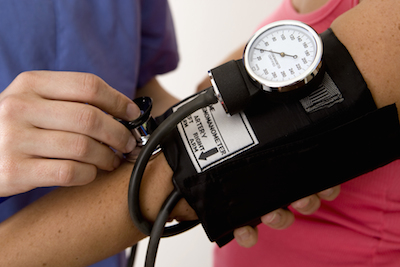
Chapter 2. Why Do We Crave Salt?
Why Do We Crave Salt?

Read the article below. Then answer the questions that follow.
A seasoning for all seasons

Most people know that a high salt diet is associated with hypertension (also called high blood pressure), which is why public health campaigns advise us to limit our salt intake. This can be difficult, since most of us have a strong taste for salt, and many recipes call for it. Grasping for a saltshaker when something doesn’t taste quite right is something we seem to do without even thinking.
Do humans eat salt only because we like the way it makes our food taste, or have our body systems evolved to need it? How can an excess of salt in our diets lead to hypertension, while a deficiency can kill us? Before we discuss these questions, let’s learn about salt—starting with its chemical description—and also learn a bit about its history with humans.
A salty tale
Table salt is an ionic compound that consists of sodium and chloride. Gourmet salts may have a different crystal structure and moisture content, and they may contain additional ingredients. But even mineral-rich French sea salts, and Hiwa Kai—a traditional Hawaiian salt that contains small amounts of activated charcoal—are both still primarily made of sodium and chloride.
Salt was crucial to humans before refrigeration because it could preserve food that would otherwise quickly rot. At times salt was as valuable a commodity as gold. Roman soldiers were sometimes paid in salt, and cutting off enemy salt supplies was used as a wartime tactic. Describing someone as “worth his salt” and “the salt of the earth” were considered high praise and are reminders of salt’s exalted status in our history.
Have we evolved to crave salt?
Some researchers suggest our cravings for sodium may be hardwired by evolution and physiology. Early in evolution, life transitioned from the salty sea to land. Researchers suggest this required a way to keep cells surrounded by a salt solution similar to seawater. As the earliest cells evolved into more complex organisms, salt was a critical ingredient of life.
Later on, our hominid ancestors evolved in an environment where salt was not readily available. The climate was hot, and while the primary diet of seeds, nuts, and veggies was high in potassium, it was deficient in sodium. This is why the kidneys evolved to conserve sodium and excrete potassium.
This may explain why our salt cravings seem primal at times—yet while this mechanism served our ancestors, it doesn’t help members of western culture, who have far too much salt in their diet. A single serving of ketchup can contain 200 mg of sodium, for example, and as our western diet has few veggies, we don’t get much potassium.
Sodium and high blood pressure

In humans, a low potassium diet causes sodium retention. This is because the proteins that carry sodium out of the cell, and calcium and potassium in, begin to function differently when the ratios of these ions change.
Increasing sodium levels inside the cell opens flood gates for calcium, which in turn cause vascular cells to contract. Low potassium levels exacerbate this, resulting in even more calcium inside the cell. This is why a diet high in potassium is thought to dilate blood vessels, while a depletion causes the vessels to contract (or close). Drugs that inhibit sodium-calcium exchanges are also being explored to treat hypertension.
High salt also causes hypertension at the physiological level. According to the rule of osmosis—the movement of water across a semi-permeable membrane towards a higher solute concentration—salt results in higher circulatory volumes. When water flows from tissue towards higher salt concentrations in the blood, the extra fluid pressure stresses the vessels. They react by thickening and narrowing, requiring more pressure to move blood through the system. This in turn stresses the heart.
Why humans need salt
Doctors recommend you eat less than 1 teaspoon of table salt—about 2.4 grams of sodium—a day. This leaves many scrutinizing the ingredient lists on the back of ketchup bottles and other foods that contain a lot of sodium. Even so, completely eliminating salt from our diets is not an option. There are many vital functions that cannot happen without salt.
Salt controls the body’s ability to regulate fluid levels at the cellular level, and our normal growth requires the ingestion and retention of sodium. Without dietary salt, animals and humans grow more slowly, they can’t reproduce, and sometimes even die. People that eat sodium-free diets cease to mineralize bone, and tissue growth stops. Short-term sodium deficiency can cause a range of problems, including muscle cramps, loss of appetite, nausea, as well as the disruption of glucose metabolism and blood viscosity.
While salt is critical for body functions, it has been—as we have discussed—a scarce commodity through history. Because not everyone could afford to indulge their salt cravings, hypertension didn’t cause as much trouble historically. Yet now that modern refinement processes have made salt available to the masses, high blood pressure is on the rise.
Salt & Adrenal Glands
One of the most commonly referenced cases of salt deprivation occurred in 1940, when a boy suffering from an undiagnosed adrenal disease began pouring table salt from the shaker into his mouth. “Salt” was one of the first words the child spoke.
Sadly, the child died shortly after hospitalization, as the food he was fed didn’t contain enough salt. An autopsy later confirmed his adrenal disease.
The adrenal glands produce hormones such as aldosterone, which help the kidneys reabsorb sodium ions into the blood. Water follows the salt and this helps maintain normal blood pressure.
Aldosterone also works with the sweat glands to reduce the loss of salt through sweat, and it helps taste buds become more sensitive to sodium.
© 2015 WH Freeman and Company.
2.1 Comprehension Questions
Answer the following questions to demonstrate your understanding of the article.
1.
Doctors typically recommend consuming no more than _____ of sodium each day.
| A. |
| B. |
| C. |
| D. |
| E. |
2.
Complete the following paragraph:
Eating foods high in salt results in water moving from the to higher salt concentrations in the . The extra fluid pressure in turn puts added stress on the .
3.
Fill in the Blank:
Human kidneys evolved to conserve and excrete .
4.
Complete the following paragraph:
Table salt is made up of and , which are ionically bonded together.
5.
True/False:
A diet high in potassium leads to increased sodium retention and ultimately hypertension.
6.
The adrenal glands produce the hormone ________, which helps conserve salt by increasing the amount that is reabsorbed into blood and reducing the amount lost through sweat.
| A. |
| B. |
| C. |
| D. |
| E. |
7.
Based on information found in the article about salt’s place in history, which of the following are true? Select ALL that apply:
Before refrigeration, salt often was used to preserve perishable foodstuffs.
All salts have the same basic chemical composition.
In Ancient Rome, it was common for soldiers to be paid in salt.
Over-salting the enemy’s food supplies was a common war tactic in ancient times.
Phrases like “salt of the earth” have a negative connotation because salt was such a common, ordinary resource throughout history.
8.
Some researchers suggest that humans are “hard-wired” to crave salt. This most likely occurred as a result of evolution, when:
| A. |
| B. |
| C. |
| D. |
| E. |
9.
Although reducing salt intake can help prevent hypertension, eliminating all salt from your diet actually can be detrimental to your health. Of the choices below, which correctly describe possible negative effects of eliminating salt from one’s diet? Select ALL that apply:
growth and development slows
inability to reproduce
blurred vision and light sensitivity
bone formation/mineralization ceases
rapid tissue growth and cancer
10.
A male patient, age 30, goes to the doctor complaining of muscle cramps, loss of appetite, and nausea. He mentions that he works for a landscaping company and has been working outside during a heat wave, at least 10 hours a day for the past two weeks. He says that he has been drinking lots of water each day, eating only fruits and leafy vegetables, and has avoided eating meats and dairy products. Which of the following is the correct diagnosis for this patient?
| A. |
| B. |
| C. |
| D. |
| E. |
Activity results are being submitted...